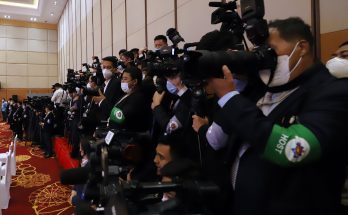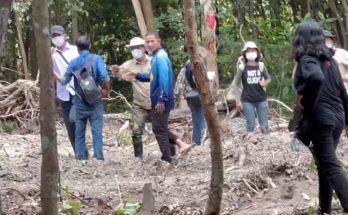Media Release
 On January 16th, VOD (Voice of Democracy) reporters spoke to United Nations Special Rapporteur Surya P. Subedi about the human rights situation in Cambodia, saying that political reconciliation is the only way forward.
On January 16th, VOD (Voice of Democracy) reporters spoke to United Nations Special Rapporteur Surya P. Subedi about the human rights situation in Cambodia, saying that political reconciliation is the only way forward.
His tenth fact-finding mission marks his first visit to Cambodia since the July 2013 elections. His visit was not initiated by the violent crackdown on street protests on January 3.
The envoy said he was “very happy” about the peaceful, disciplined nature of the demonstrations that followed the elections from September to December.
However, the excessive use of violence by military police to suppress demonstrations prompted the UN envoy to feel that the country was “going backwards again”.
Nonetheless, after ‘cordial and constructive’ dialogue Subedi is hopeful and optimistic that the reform the Prime Minister promised him will result in a brighter future for Cambodia.
“I am more confident this time than in the past that the Prime Minister was serious about this and will be able to do something for the country working together”.
In particular, the reform that was discussed includes judicial, electoral, and parliamentary reform and land titling issues.
In response to opposition party CNRP leaders Sam Rainsy and Kem Sokha’s trial on 14 January and what outcome he would like to see, Subedi replied it was in hands of the court and stated that “all these things have come about because of the political deadlock. So both parties should come together, go back to the negotiating table and resolve the political deadlock then the country will move forward and all of these things will become unnecessary”.
He further stated that in the interest of the people of Cambodia, the answer to moving forward is political reconciliation via negotiation between the political parties.
Moving forward
As part of a focus of this mission, Subedi also talked about establishing truly independent human rights institutions, which are given the power to offer remedy and protection to “those who have concerns, those whose rights have been violated, those who have their grievances”.
In his discussion with the Prime Minister, Subedi also proposed a mechanism be established for setting the national minimum wage, to “narrow the gap between the rich and the poor”.
“There should be an equal distribution of prosperity/wealth among the people of the country”.
In response to corruption, the UN envoy states that, “independent, robust and resourceful” institutions should be created in order to control the problem of corruption.
Change
The UN envoy concluded that both political parties should hold rule of law, democracy and human rights in the highest respect. The answer to many of Cambodia’s issues is via a serious and comprehensive reform program that underpins political compromise.
Subedi’s next mission in approximately May/June will be primarily to examine what progress has been made.
“Next time, I hope the country will have returned to normalcy, a political settlement will have been reached and process of reform will have accelerated and everybody will be looking forward to a brighter future”.
NOTE: CCIM was established in June 2007 and registered with the Ministry of Interior as a non-governmental organization. CCIM is the legal entity of VOD Radio, which originally began airing in January 2003 under the supervision of the Cambodian Center for Human Rights (CCHR).
By Francien Boom


